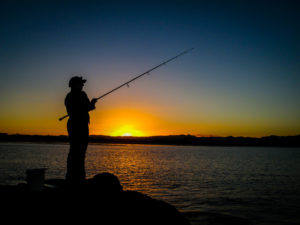
Summertime fishing from the shore can be a bit hit and miss sometimes. Fishers at their favourite holiday destinations may have escaped the bustling city but many of those city dwellers are now filling the campgrounds and hitting the rocks or beach to catch some dinner. The popular coastal destinations start to get crowded and the local wildlife seems to notice and depart for quieter waters.
Daytime fishing when there is a lot of activity like swimmers and divers and boats blasting past will put the fish off, especially the bigger ones. Of course if you’re outside with the kids then swinging a fishing rod is better than leaving it at home, however, the holiday fisherman may need to be a bit smarter about targeting a catch.
In summer you will often find yourself pulling in lots of small fish during the heat of the day. To target the bigger fish do your serious fishing at the change of light, especially in the early morning before the rest of the family wakes up. You’re less likely to hook the small fellas (and risk harming them). You can also try changing locations if you happen to be stuck in the nursery. Of course, if the whole family is mad keen then an early morning mission with everyone is a good idea.
Daytime fishing can pay off for species like kahawai and kingfish that come into the shallows to hunt small prey like yellow-eyed mullet. Using lures to target these fish is a smart idea and bringing along a fishing rod (just in case) on a trip to the water saves the family from smelly bait in the back of the car and protests about why fishing gear was brought on a family outing.

Family trips are the perfect time to teach young children about conservation principles like how to release fish without hurting them. Kids often get over-excited and innocently squeeze the life out of small fish. They will likely also want to keep what they catch, without a plan of what to do with them. This is the time to teach them about utilisation – will they keep their catch, and will they eat it? Don’t forget to get a photo of the catch so the fish doesn’t have to be killed to be celebrated. If a fish is accidentally killed during fishing time (and as long as it’s not undersized) then keeping it for the family meal, for the cat or bait can help youngsters understand the importance of utilisation and avoiding unnecessary waste.
Hooking kids on fishing and the great outdoors is a far better option than being immersed in the digital world with little purpose other than entertainment and killing time. Fishing is educational, relieves the anxiety of social pressure and can be a lifelong positive influence in a person’s life.


